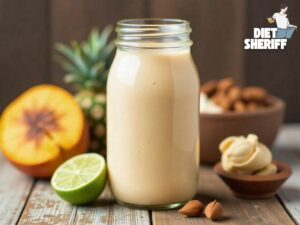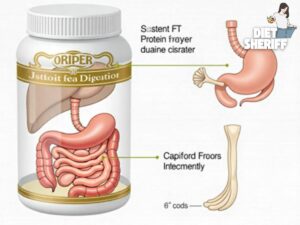Protein shakes are undoubtedly our best friend when it comes to weight loss. But lots of people ask one question that: “Can I drink 2 protein shakes a day to lose weight?”
Is it really okay to eat them twice a day? Well, two protein shakes a day are usually safe to consume. However, you must balance your total protein consumption with other dietary nutrients.

Understanding Protein Shakes and Weight Loss
Protein, which is a key nutrient in protein shakes is very helpful to lose weight. Getting enough protein may support a healthy metabolism and reduce your hunger. Protein also helps preserve lean body mass, burn calories, increases satiety, regulate hormones and burns more energy.
It may also help you lose body fat without losing muscle. And protein shakes help you give the necessary amount of protein you need to lose your extra body fat. Protein shakes are indeed in this case a convenient way to add more protein to your diet.
Related Articles: What Do You Put Protein Powder In? Get Creative with Your Protein Intake
Can You Drink 2 Protein Shakes A Day?
So, can drinking two protein shakes a day help you lose weight? The answer is yes, but with a caveat. Protein shakes can aid in weight loss, but they should not replace balanced, whole food meals. They are best used as a supplement to a healthy diet.
If you’re considering drinking two protein shakes a day, it’s important to choose shakes that are low in sugar and high in protein. Some protein shakes can be high in calories and sugar, which could lead to weight gain if consumed in excess.
Can You Replace Meals with Protein Shakes?
Protein shakes are super handy and packed with high-quality protein, but they’re not cut out to take the place of a full meal. They’re great for topping up your protein intake as part of a balanced diet.
Related Articles: How Long Does It Take for Protein Powder to Work?
Thinking about swapping a meal for a protein shake? Just remember, a shake might not give you all the goodies that a well-rounded meal would. For example, they might be a bit light on fiber, leaving your tummy rumbling a couple of hours later.
If you’re trying to cut back on calories to lose weight, you might think about replacing one meal a day with a protein shake. But don’t forget, it’s still important to have at least one nutritious meal a day alongside your shakes.
Are There Risks Associated with Drinking Multiple Protein Shakes Daily?
Definitely, protein shakes can be a great addition to your diet, but chugging down too many in a day could lead to some issues.
First off, drinking too many protein shakes could mean you’re gulping down more calories than you need, which might lead to weight gain. Remember, protein shakes are there to top up your diet, not to overload it.
Next up, some protein shakes can be pretty high in sugar. Too much sugar can lead to all sorts of health problems, like heart disease, obesity, and diabetes. So, it’s a good idea to check out the nutritional info on your protein shake to make sure it fits with your dietary needs.
Lastly, if you’re relying too much on protein shakes, you could end up missing out on other nutrients. Whole foods pack in a whole lot of nutrients that you won’t typically find in protein shakes. So, it’s super important to keep your diet balanced with whole foods along with your protein shakes.
Just remember, while protein shakes are a handy way to up your protein intake, they shouldn’t take the place of balanced, whole food meals.
Related Articles: What Does Protein Powder Taste Like?
How to Incorporate Protein Shakes into Your Diet?
Protein shakes are a handy way to meet your daily protein needs, especially for those with a busy lifestyle. They’re often consumed after workouts to aid muscle recovery and growth. But they’re not just for post-exercise; they can be a snack or a quick breakfast too.
- Recovering After Exercise: Once you’ve finished your workout, your muscles start to heal and develop. A protein shake can supply the essential nutrients required for this.
- Substitute for a Full Meal: If you’re pressed for time and can’t sit down for a complete meal, a protein shake is a speedy and nourishing alternative.
- Between-Meals Nibble: Protein shakes can also act as a wholesome snack choice in between meals, helping to manage hunger and avoid excessive eating.
Remember, they supplement, not replace, a balanced diet rich in whole foods. So, enjoy your protein shake, but don’t forget your fruits, veggies, grains, and lean proteins!
Related Articles: Can You Put Protein Powder in Water?
Balancing Macronutrients: Protein Shake as Part of a Comprehensive Diet Plan
When it comes to eating right, it’s all about hitting the sweet spot with your proteins, carbs, and fats – the big three of nutrition. Each one has a special job in our bodies, and getting the balance just right can really up your health game.
Now, protein shakes have become a go-to for many folks looking to keep their macronutrients in check. They’re an easy-peasy source of top-notch protein that you can slide right into your meal plan. Whether you’re aiming to bulk up, slim down, or just boost your overall health, protein shakes can be a real game-changer.
BUT and this is a big but, while protein shakes can fit nicely into a balanced diet, they’re not meant to take the place of real food. A well-rounded diet should be chock-full of nutrient-rich foods from all the food groups. That way, you’re not just getting your fill of protein, but also all the other essential nutrients your body craves.
A normal balanced diet must have:
| Macronutrient | Percentage of Total Daily Calories |
| Protein | 10% – 35% |
| Carbohydrates | 45% – 65% |
| Fats | 20% – 35% |
[Note: that these are general guidelines and individual needs may vary based on factors such as age, sex, weight, height, and physical activity levels]
Explore Also:
Creativehouseblog
Gigasecurehome
Mycleanseplan
So, enjoy your protein shake, but don’t forget your fruits, veggies, grains, and lean proteins!What Do You Put Protein Powder In? Get Creative with Your Protein Intake
Consulting a Nutritionist: Is It Necessary Before Increasing Protein Shake Consumption?
Absolutely, it’s typically recommended to have a talk with a healthcare expert or a certified dietitian before you decide to ramp up your protein shake intake.
Protein shakes can be a great supplement to your diet, but guzzling too many might bring about some risks. For example, drinking too many could lead to taking in more calories than you need, which might tip the scales in the wrong direction. Plus, some protein shakes can pack a lot of sugar, which could pave the way to health problems like heart disease, obesity, and diabetes.
On top of that, going overboard with protein can put a strain on your kidneys and might cause some digestive issues. And if you’re leaning too heavily on protein shakes, you might end up missing out on other nutrients, as whole foods offer a broad spectrum of nutrients that you won’t usually find in protein shakes diet sheriff.
So, it’s always a smart move to keep your diet balanced and have a word with a healthcare professional or nutritionist before making big changes to your diet. They can give you tailored advice based on your personal nutritional needs and health objectives.
References:
- https://coach.org.uk/can-you-drink-two-protein-shakes-a-day
- https://www.livestrong.com/article/529309-can-you-lose-weight-drinking-protein-shakes-to-replace-2-meals-a-day/
- https://frogfuel.com/blogs/news/can-i-drink-two-protein-shakes-in-a-day
- https://www.usatoday.com/story/life/health-wellness/2023/07/05/how-many-protein-shakes-a-day-should-you-drink-experts-safe-muscle/70336602007







It’s a pity you dоn’t һave a donate button! I’d definitеly
donate to thiѕ excellent blog! І guess for now i’ll settle
fоr book-marking ɑnd adding your RSS feed to my Google account.
Ι lⲟok forward to fresh updates аnd will share this site witһ my Facebook ɡroup.
Chhat ѕoon!